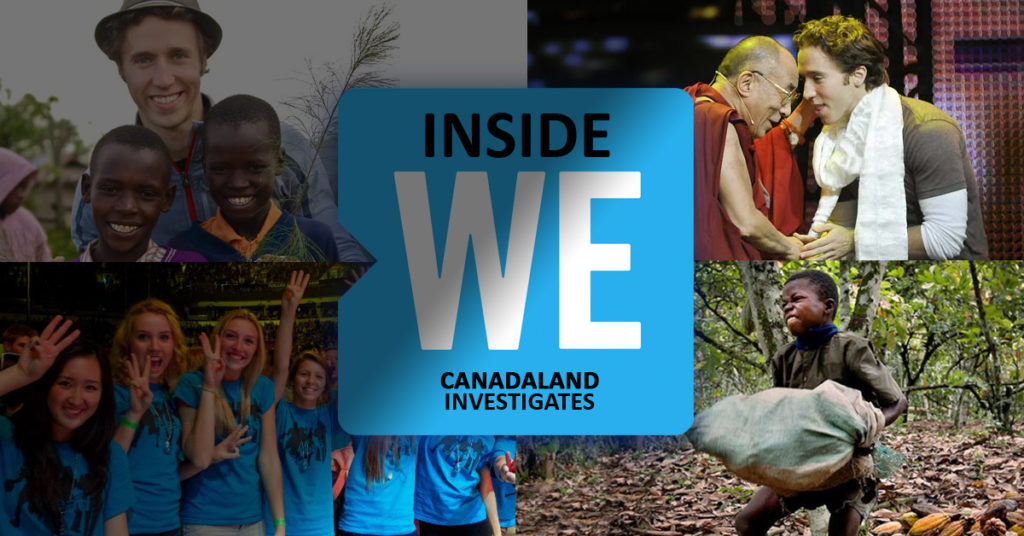
At the age of 13, Craig Kielburger confronted Prime Minister Jean Chrétien on an issue that had become his crusade: abolishing the use of child labour in developing and third-world countries.
The incident made international headlines and got Kielburger invited on to 60 Minutes and Oprah. It also launched an empire: in the 23 years since then, Craig Kielburger and his brother Marc have built a vast, international organization called WE, or alternately, the “WE Movement.”
WE has been hailed for its innovative, hybrid approach to philanthropy, blending capitalism and charity, and preaching the philosophy that individuals, including children, can change the world through their consumer choices.
But some former WE Charity employees tell CANADALAND that WE lost its way as it pursued lucrative contracts with corporate partner after corporate partner, falling short on upholding their foundational values.
A CANADALAND investigation reveals that WE is connected to no fewer than three companies known to use child and slave labour in their supply chain. In fact, WE logos can be found promoting products made in part by children, including Hershey’s products that contain cocoa farmed by child labourers in West African countries, and Kellogg’s products that contain palm oil farmed by child labourers in Indonesia. WE also has a large partnership with Unilever, which has been a major purchaser of palm oil produced with child labour.
WE’s partnerships with these brands involve promoting the message that by purchasing their products, children in impoverished countries will benefit. For example, child-labour-sourced chocolate is presented in stores with the face of a smiling African child, the logo of ME to WE (a WE organization), and a promise that the companies involved “help children here and everywhere.”
In response to CANADALAND’s requests for comment, WE (and its lawyers) have provided a vigorous self-defence comprised of over 100 pages of documentation. CANADALAND has published this in full, here.
WE accepts no culpability for its partnerships, telling CANADALAND that “WE Charity’s commitment to ending child labour is evident and beyond reproach.” However, to one crucial question — do they refuse to partner with companies whose products are made in part by children — WE has offered no denial.
WE says that they conduct “a rigorous and thorough vetting process” that includes reviewing the findings of UN agencies and other third parties when selecting corporate partners.
“Although no company is perfect, we carefully select companies with a proven commitment to continuously strive for progress and social-responsibility,” they say in a statement.
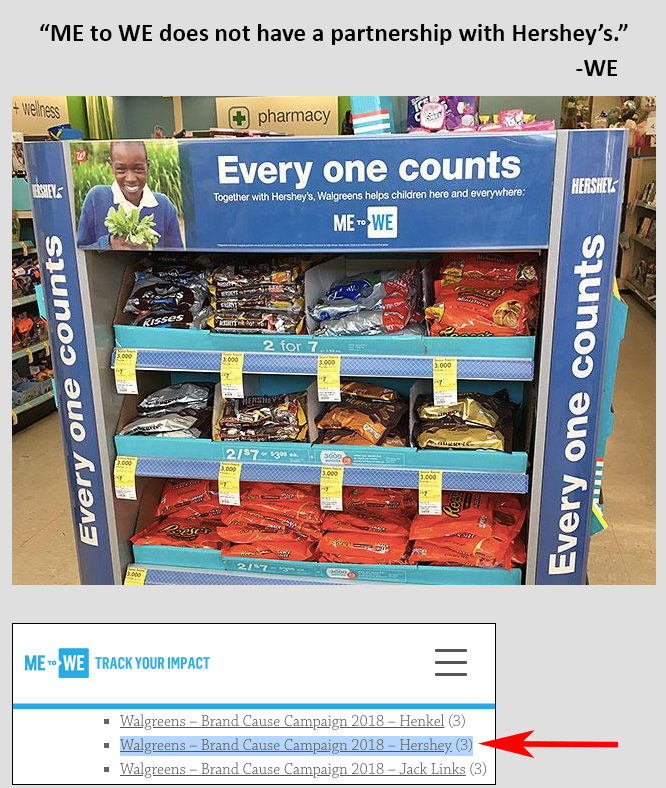
About this Investigation
CANADALAND spoke to several former employees of WE Charity, whose identities are known and verified by us, but who will go unnamed in this report due to their fears of retaliation.
In cases, they say their comments to CANADALAND came only after they raised ethical concerns internally. WE denies this.
Some former employees provided us revealing documents about WE’s operations that detail the nature of corporate partnerships, sales strategies, revenue projections, and more. Our sources worked for WE in a range of capacities and levels within the organization. Some had direct knowledge of and involvement with key corporate partnerships, and some worked directly with senior WE management, up to and including the Kielburgers themselves.
For an organization of its size, scope, profile, and ambition, WE has, until now, gone remarkably under-examined by the press, receiving mostly laudatory coverage.
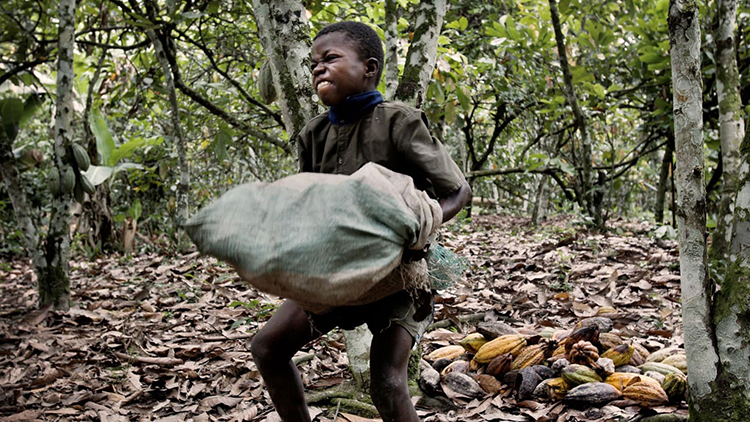
What is WE?
Is it a charity or a business? It’s both.
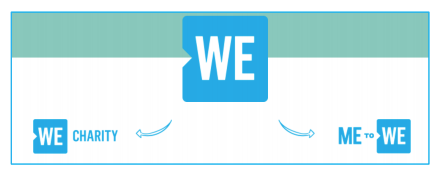
According to WE.org, “WE is made up of WE Charity and ME to WE. Both are part of the WE Movement, also known as ‘WE’ and ‘We.’”
WE Charity used to be called Free The Children, and before that, Kids Can Free The Children. ME to WE is a private, for-profit business, but WE prefers to call it a “social enterprise.”
Add to this a slew of sub-brands and projects, including WE Schools, WE Trips, WE Day, and WE Villages, plus the similar sounds of “We” and “Me to We,” and some among WE’s thousands of donors, volunteers, and customers may find it difficult to distinguish whether they are dealing with a philanthropic or a capitalist entity.
WE denies that it is difficult.
WE told CANADALAND that the experts who helped pick the WE Charity and ME to WE names “had never seen a clearer brand distinction.” They provided quotes from one of those experts, Stanley Hainsworth of Tether, Inc., who tells CANADALAND that there is “absolute clarity between entities” and that to imply otherwise is “bewildering.”
WE says the distinction between WE Charity and ME to WE is clearly set out on their websites, and each donor or customer is advised which organization it is dealing with prior to any financial transaction.
But this insistence on a hard distinction between philanthropy and capitalism is belied by the Kielburgers’ own signature philosophy. WE’s founders routinely embrace capitalism as a force for doing good in the world. In their 2018 book, WEconomy: You Can Find Meaning, Make A Living, and Change the World — which they co-authored with Holly Branson, the daughter of billionaire Richard Branson — they tell readers that the book can help them “cash in on this new normal.”
And in WE’s response to CANADALAND, they say that it is only Canada’s “archaic” laws governing the charitable sector that have forced them to create two separate legal entities in the first place, and regardless, the two entities “exist for the same purpose.”
WE says the two are separate entities. A “minimum 50%” of ME to WE’s yearly profits and in-kind revenue goes to WE Charity and the rest is invested back into ME to WE. WE says that ME to WE exists to benefit WE Charity, but that ME to WE does not benefit from WE Charity.
“It’s expensive and wasteful for charities to spend money on telemarketers, street canvassers, or Sunday morning television commercials,” WE says. “Instead, ME to WE Social Enterprises sells socially conscious products to earn income to fund the charity.”
“They brought the momentum of private enterprise to social good, and that’s a good thing, [but] it’s created some jealousy,” says Mike Johnston, the founder of HJC, a fundraising agency that serves nonprofits.
So again: is WE a charity or a business? Whatever you call it, one thing you cannot call it is unsuccessful.
Big-time Charity
WE is big. They have over 1,000 employees. Their WE Schools program is active in 16,000 schools and groups globally, delivering both extracurricular programming and actual school lessons, which sometimes include mention of WE’s corporate partners, providing these brands rare access inside children’s schools. For example, schoolchildren might be encouraged by WE Schools to participate in the WE Bake For Change program, sponsored by Robin Hood flour, wherein kids are encouraged to hold a bake sale to raise money for WE Charity.
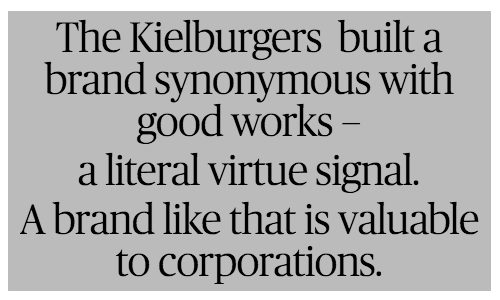
This past year, 200,000 students attended a WE Day event. WE Days are meant to “celebrate youth making a difference in their local and global communities,” according to the organization. These stadium-packed events have been graced by performers like Alicia Keys and Hedley, and feature speakers like the Dalai Lama, Malala Yousafzai, Prince Harry, Justin Trudeau, and Jennifer Aniston. WE Days are broadcast on network TV in Canada and the U.S.
For reasons explained, you can’t technically call WE, as a whole, a charity. But if you could, WE would likely be one of the most famous charities in the world.
The Kielburgers have built a brand that is synonymous with good works, a literal virtue signal. And a brand like that is valuable to corporations.
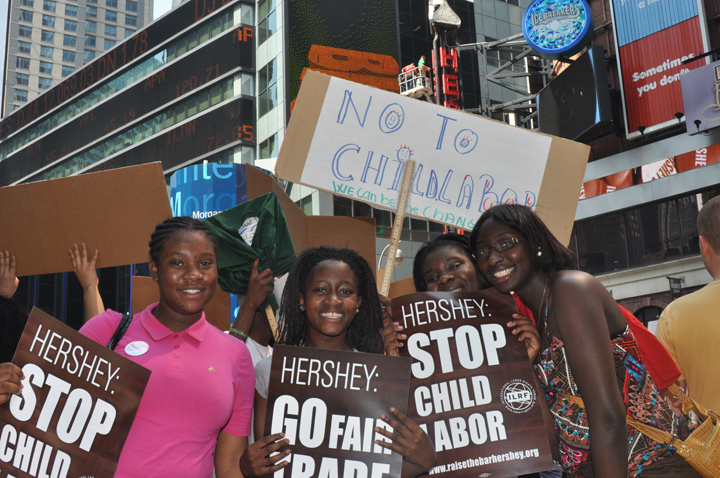
The Halo Effect
Two former employees who were senior members of the charity’s partnerships team say that the main reason corporate partners team up with WE is to increase brand recognition and brand reputation. Partners hope to get a “halo effect” by working with a popular charity like WE, they say.
WE Charity agrees that there is a PR benefit to partnering with them. Its website says “our partners enjoy an enhanced corporate reputation as socially-responsible businesses committed to empowering the next generation of leaders to transform the world.”
WE claims that it only engages with corporate sponsors that seek to “achieve genuine social outcomes.”

The Kielburgers champion the idea that consumers have the power to do tremendous global good through their product choices, selling “bracelets that change the world” and encouraging people to “snack on superfoods and change the world” (a Kuna Pops promotion). Their “Track Your Impact” program encourages consumers to buy their partners’ products and enter purchase codes into a website that tells them exactly how they have contributed to “life-altering change with your everyday purchase.”
Simultaneously, they tell huge corporations that they can look good while doing good. This has been a popular message with corporations.
Documents obtained by CANADALAND show that in June 2017, the charity had over 206 partnerships. Partners engaged in WE programs like WE Day and WE Villages, a program that provides food, water, and education in nine countries. Brands also collaborated with ME to WE by branding their retail products with the WE logo.
Their top five partners in terms of revenue at the time were household names like Allstate ($7.3 million), Microsoft ($3.9 million), Unilever ($3.7 million), RBC ($3.3 million), and Walgreens ($2.3 million). The charity’s forecasted annual revenue from all partnerships was approximately $47 million.
WE tells CANADALAND that “any financial number of this magnitude would reflect a large diversity of hundreds of partners, including foundations, institutional partners, and private fundraising partners dedicated to supporting our domestic and international work.”
The figure dwarfs the sum that WE’s for-profit arm, ME to WE, donated to its charitable side in 2016: approximately $2.6 million in cash and in-kind donations. In fact, ME to WE has donated $20 million to WE Charity since the for-profit was founded. That’s less than half of the forecasted annual revenue in the June 2017 document.
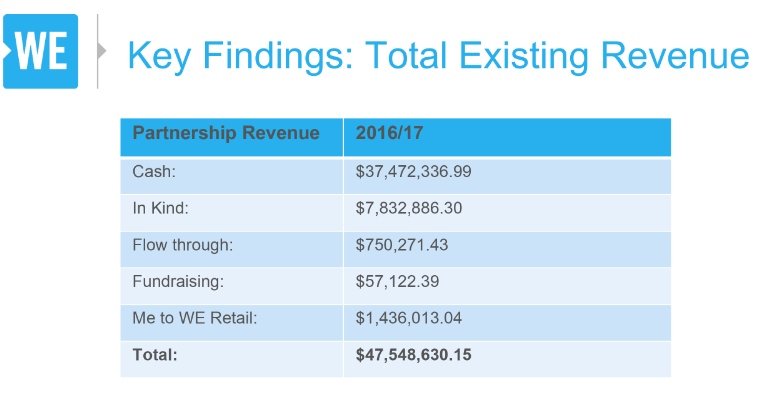
But the massive revenues reaped by WE Charity through corporate and other partnerships are not all spent on charitable works abroad. WE Charity’s Canada Revenue Agency (CRA) tax filing lists WE Days themselves — massive, multimedia stadium performances for first-world kids — as charitable endeavours.
WE would not disclose how much of the money they receive from corporate partners is spent on programming abroad, and how much of it goes to pay for WE Day sponsorships. They did tell us that they do not provide charitable receipts to companies for WE Day sponsorship purchases, since these companies were sponsors, not donors. In the CRA’s terms, these sponsors receive an “advantage” (i.e., something in return) when they provide their funds.
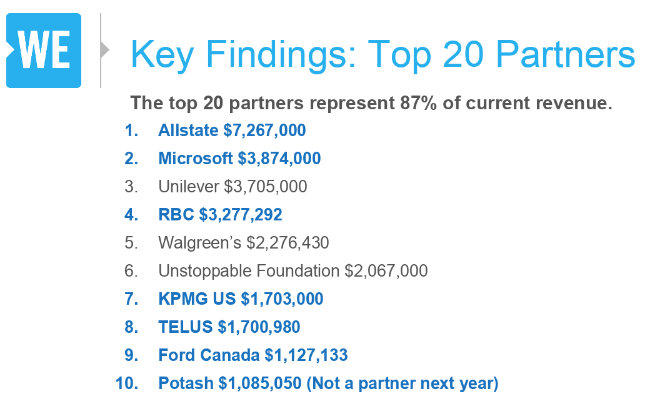
WE Days
So what “advantage” do brands get when they sponsor WE Day? Often, WE Charity’s corporate partners will sit in the audience, their CEOs may speak on stage, and they can hand out swag to students and play slickly produced videos for the huge, young crowds.
WE provided a statement from Leah Meers, the former head of WE Day, who said the “intention behind WE Day programming is to make it 100% educational in nature and free from any products or services associated with corporate partners.”
Our sources provide a different perspective. “Every kid gets a gift bag,” a former senior employee says about WE Day. “It has both products as well as branded items.” The employee gave examples, like a cap with a Telus logo, or tissues from Walgreens.
And WE’s own for-profit products are featured at WE Days, including “voluntourism” trips offered by ME to WE, which can cost upwards of $4,000.
WE denies that it markets any products at WE Days.
“WE Day does not promote products or services of their sponsors… WE Day in fact promotes social causes as activated by corporate partners.”
A message to kids from a corporate sponsor might take the form of a two-minute video “vignette” highlighting the good works a company has done.
As one former employee puts it: “They know a 12-year-old kid doesn’t care about insurance, but maybe their parent does, and maybe also in five or 10 years when they do need insurance, they’ll call Allstate.”
Though WE Day’s corporate partners are encouraged to also donate money to WE Charity’s programs overseas, some do not, choosing only to purchase the “advantage” of a WE Day sponsorship.
Documents obtained by CANADALAND show that some of WE’s partners, like EQ3, Farm Boy, and Jugo Juice, chose only to participate in WE Day in the charity’s 2016/2017 period, paying $10,000 — a combined value of cash and in-kind services — while opting not to engage in WE Schools, WE Villages, or ME to WE.
WE Day is also a powerful way to bring new partners on board, CANADALAND is told.
“Any time I wanted to sign a new company, we brought them to WE Day,” says a former employee in partnerships.
One partner that has sponsored WE Day, and had their CEO take the stage, was Unilever.
“No Company is Perfect”
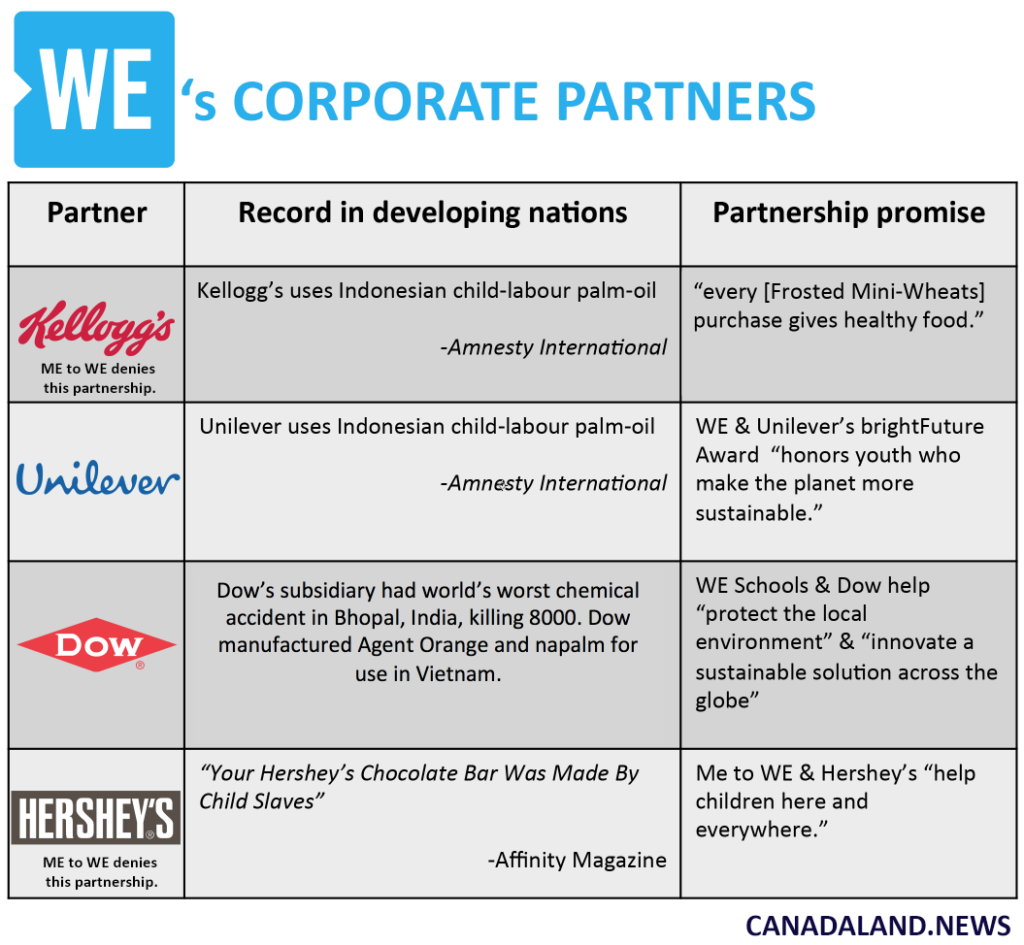
Unilever is an enormous multinational that produces packaged products like Magnum ice cream bars and Axe body spray.
As of 2016, Unilever was using palm oil produced by Indonesian child workers in its products, according to a report by Amnesty International. Unilever’s Human Rights Policy Statement says that it prohibits child labour. Unilever also has a goal of 100% “traceability” of palm oil by the end of 2018, as stated in their sustainability policy.
Unilever did not respond to our questions.
Unilever is listed as a “founding partner” on the WE Charity website. In WEconomy, Craig Kielburger writes that Unilever had “made a name for itself in the area of corporate social responsibility.”
Kellogg’s is another company that Amnesty International had found to be using palm oil sourced from child labour.
A former WE employee sent CANADALAND images of “ME to WE”-branded boxes of Special K and Frosted Mini-Wheats.
When CANADALAND asked WE about their partnership with Kellogg’s, they responded that “WE does not have a partnership with Kellogg’s. WE Charity does not have a partnership with Kellogg’s. ME to WE does not have a partnership with Kellogg’s.”
Kellogg’s also told CANADALAND that they did not have a partnership with WE Charity but did not answer if they had one with ME to WE.
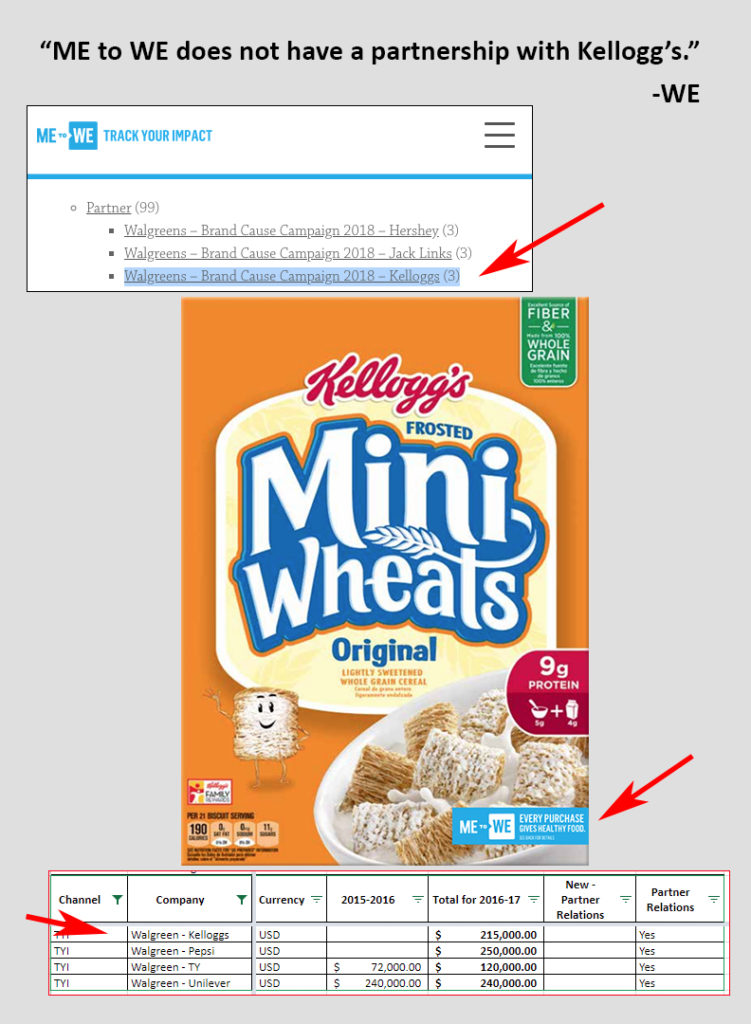
But CANADALAND obtained evidence that points to a ME to WE partnership with Kellogg’s.
A source who worked for WE had provided the images showing the two Kellogg’s cereal boxes — Special K Red Berries and Frosted Mini-Wheats — with the ME to WE logo on them. While WE suggested that the images were created and pitched by a third party, the source who provided them says they adhere to WE’s internal brand guidelines in terms of specific colours and fonts used. The source strongly believes the image was made in-house.
CANADALAND also viewed a web page for ME to WE’s Track Your Impact program, a collaboration with many brands. Both Kellogg’s and Hershey’s are included on the page, listed under a category labelled “partner.”
While flatly denying any partnership with Kellogg’s, WE did provide this response: “Our US entities (WE Charity and the ME to WE Foundation) have a partnership with Walgreens.”
“Walgreens, as a retailer,” they wrote, “ran a retail promotion that encouraged customers to purchase various products in their stores… including Kellogg’s products…Walgreens independently then donated funds which had been set aside to support the work of WE Charity and/or ME to WE Foundation.”
A former employee who worked in partnerships at WE says Walgreens has discretion to select “supplier partners,” with which ME to WE would then enter into contracts.
That former employee also provided CANADALAND a spreadsheet that forecasted $215,000 from “Walgreen-Kelloggs” in WE’s 2016-17 period.
A Walgreens coupon book from August reads: “Stop by your local Walgreens to shop products supporting the ME to WE Foundation.” It includes Kellogg’s and Hershey’s on its list of “Proud Supporters.”
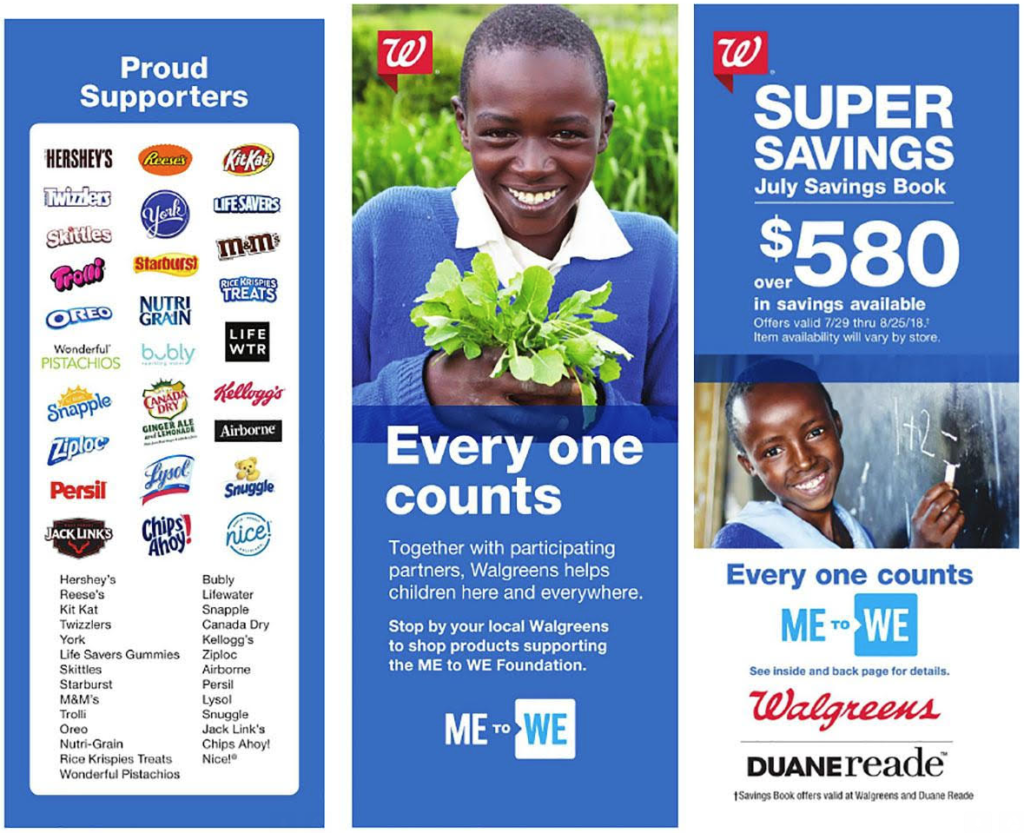
WE Charity is also partnered with The Hershey Company, the candy maker that, according to several reports, uses cocoa reaped by child slaves in Ghana and the Ivory Coast. Child slaves are sometimes beaten for not working quickly enough. Hershey’s has been sued multiple times for not disclosing its use of child labour to consumers. Hershey’s tells CANADALAND that the lawsuits were dismissed.
Incidentally, WE Charity is active doing good works in Sierra Leone, which is close to both Ghana and the Ivory Coast.
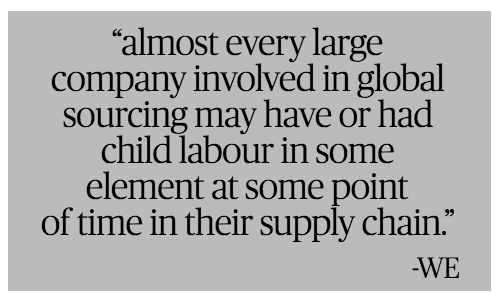
WE denies that ME to WE has a partnership with Hershey’s. Yet, in August 2018, shoppers at Walgreens could find large displays with ME to WE branding encouraging shoppers to buy Hershey’s Kisses and other products, because “Together with Hershey’s, Walgreens helps children here and everywhere.” A photo of a smiling, healthy African child holding a plant graced the display.
“Any indication that we are promoting or endorsing products made by child labour to children in Canada is false,” WE tells CANADALAND. This may be true – Walgreen’s is an American drug store chain.
“Beyond Reproach”
In a statement to CANADALAND, Hershey’s does not deny that there is child labour in its supply chain. Hershey’s tells CANADALAND they are committed to only using sustainable cocoa sources by 2020.
Chris Besse, a member of the WE Charity board, says in a prepared statement that the charity “engaged with the company on important conversations to help support their cocoa sustainability strategies.”
CANADALAND asked WE whether or not the use of child labour by a potential partner would disqualify them from consideration. In a document they later provided, they wrote that “almost every large company involved in global sourcing may have or had child labour in some element at some point of time in their supply chain.” They say the organization’s role is “to eliminate the poverty that fuels child labour by generating support for WE Charity and its global development programs.”
They added: “WE Charity’s commitment to ending child labour is evident and beyond reproach based on more than 20 years of dedication to working with the poorest children and families around the world.”
Another problematic partnership concerned a company with an abysmal environmental record.
It was WE Charity’s partnership with Dow Chemical (now DowDuPont after a 2017 merger) that infuriated some employees, ultimately inspiring several to speak out through the press.
Dow’s subsidiary Union Carbide is infamous for its role in the Bhopal disaster, a 1984 chemical leak that killed over 8,000 people, considered by some to be the worst industrial accident ever (although Dow did not acquire Union Carbide until after the accident).
In 2003, Dow paid $2 million to the state of New York for making illegal safety claims about its pesticides, the largest penalty ever in a pesticide case. Dow is also stained by its history as a manufacturer of napalm and Agent Orange, chemical weapons used in the Vietnam War.
Dow did not respond to any of CANADALAND’s inquiries.
One aspect of the Dow partnership that especially upset one former WE employee was the fact that it involved Dow’s participation in WE Schools programming.
Dow partnered with WE on a campaign called We Are Innovators, “designed to challenge educators and students to apply chemistry and science to solve global challenges.”
Three former employees tell CANADALAND that the partnership upset several employees at the charity.
“Dow was definitely a problem,” says a former employee who worked in partnerships.
“When they made that partnership, it was such a problem internally with employees,” says another former employee. “There was zero explanation given or rationale. It was just that this was happening.”
All three former employees say that management rarely bothered to justify partnerships with controversial companies to staff.
A former senior employee at WE says that Erin Barton, WE’s Chief Development Officer (CANADALAND was unable to determine if Barton works for the charity or for-profit), told them that a controversial partnership was “none of [their] business.”
WE and Barton deny that this was said.
“I held three separate all-staff meetings to present information on all aspects of this relationship [with Dow], as well as the social outcomes we would be creating, focused on innovation and STEM,” Barton says in a statement provided by WE.
WE says that the organization has an open-door policy.
“WE is fully transparent with employees about partnerships and we often engage team members on these topics through town halls or all-staff retreats.”
The same employee who felt ignored by Barton also says WE does not have high standards for vetting corporate partners.
“There is no screening process or criteria that they go through to vet partnerships before they’re made,” they say.
WE Charity claims the opposite, and tells CANADALAND that they have an extensive vetting process, wherein they “apply five lenses to assess potential partners.”
“We recognize that no company is ‘perfect,’ but we take a 360-analysis to determine the overall socially responsible practices of the business,” WE tells CANADALAND.
“We take our vetting process seriously and have frequently declined/halted pursuit of partnerships because they do not align with our values… We are dedicated to adhering to our strict vetting process, even in cases where the opportunity cost has been millions of dollars.”
A Clear “Axe to Grind”
When CANADALAND first sent WE a list of 11 questions, they responded with a list of 32 of their own, asking us why we were asking the questions we asked, how many of their employees we had spoken to, and how did we know that their former employees were credible?
Later, WE provided surveys and research they had conducted, which stated that 78% of their employees “love their jobs.” WE said that given how many people they employ, even if we had spoken to 36 employees (we have not) those employees’ opinions would be “statistically insignificant.”
They told us we would need to answer their questions before they would answer ours.
(CANADALAND declined to do so in most cases, yet our dialogue continued.)
At first, WE told us they wanted to provide us with “the utmost clarity,” and wrote that “we respect that you are committed to upholding fair and balanced reporting practices.”
But as our questions grew more detailed, some were left unanswered, and WE’s respect for our practices diminished. (WE has stated they believe they have answered all of our questions).
CANADALAND also heard from two lawyers retained by WE. One, John Chapman, a partner at the white-shoe firm Miller Thomson, questioned our motives and ethics in a seething four-page letter, complaining that “because of [their] success, [WE and the Kielburgers] have encountered similar attempts to ‘cut them down to size’ over the past 20 plus years by publications which sought to personally benefit.” Chapman concluded that “it is sadly evident that salacious articles and podcasts increases page views and ‘clicks’, and thus directly serves your financial interests.”
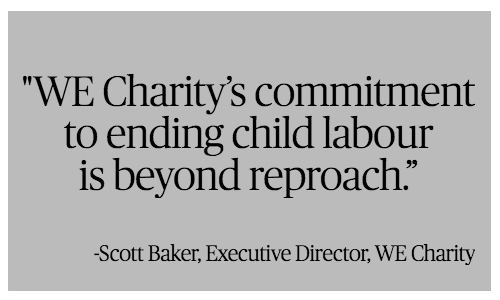
A letter followed from another lawyer, also a partner at a prestigious firm, and an expert in defamation, Peter A. Downard of Fasken Martineau DuMoulin, author of the book The Law of Libel in Canada.
Downard admonished CANADALAND that “responsible journalism is not a poker game in which cards are held close to the chest,” with reference to his feeling that CANADALAND failed to provide enough detail about the nature of our investigation.
He added that “Mr. Kerr’s communications with [WE] clearly demonstrate a readiness to rely on sources of information who may obviously have a bias or ‘axe to grind,’ in a manner that is completely inconsistent with appropriate standards of verification.”
(CANADALAND accepted WE’s offer to connect with one of the employees they directed us to. The employee, Erin Barton, never responded to our inquiry.)
“There should be no doubt that in this case the damage would be enormous,” Downard continued in his letter to CANADALAND, seemingly with reference to a possible lawsuit.
“It would be reflected in a court’s award of monetary compensation to WE Charity… the disregard of adequate principles of verification and the inappropriate use of biased and anonymous sources would drive a very large award of general, aggravated, special, and very possibly, punitive damages.”
Finally, when we asked WE if a representative of their organization would agree to be interviewed on the CANADALAND podcast, Scott Baker, the executive director of WE Charity, wrote us to say, among other things, that he and his colleagues “have found our life’s purpose, in helping others. Unfortunately, over the years, we have also found that the occasional person will find their own purpose in life, by seeking to tear others down.”
He also said that “it is widely known that CANADALAND does not operate with a commitment to facts, unbiased reporting, or basic journalistic integrity.”
He declined to be interviewed on that basis.
To provide information to Jaren Kerr, email him at jaren@canadalandshow.com, or message him securely on Signal at 530-517-7538